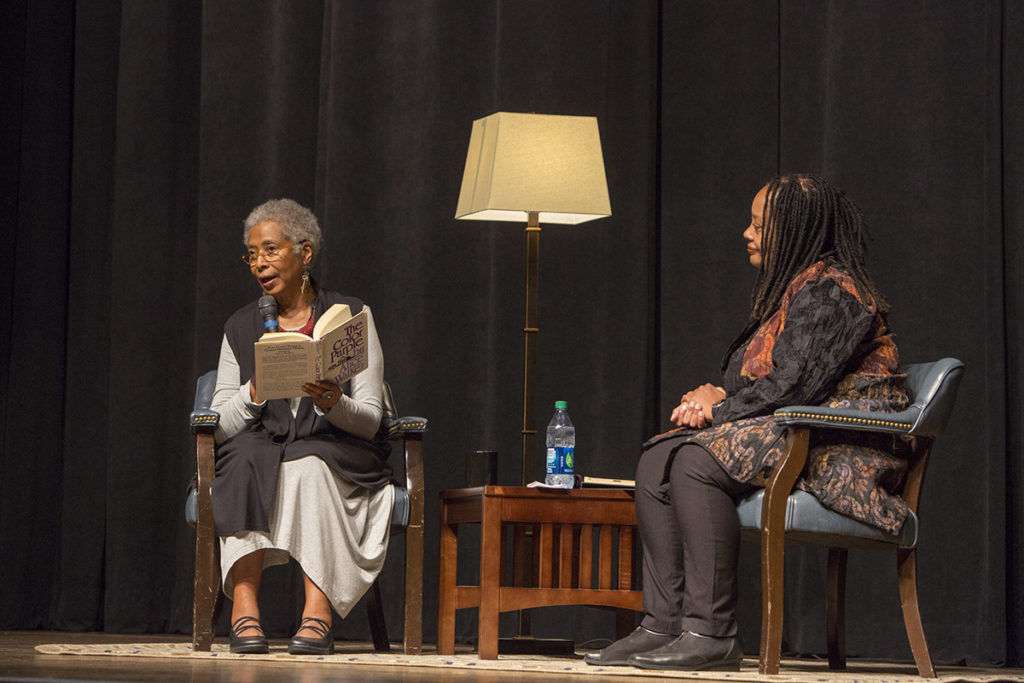For Valerie Boyd, the study of Alice Walker is a highly intimate, unique and immersive experience.
The two met while Boyd was writing a biography on Zora Neale Hurston.
An associate professor of journalism in UGA’s Grady College of Journalism and Mass Communication, Boyd was personally selected by Walker two years ago to curate and edit the author’s journals for a book, due out in fall 2017. Gathering Blossoms Under Fire: The Journals of Alice Walker will be published by 37 Ink, an imprint of Simon and Schuster. Boyd’s work on the journals is supported in part by a 2015-2016 Willson Center faculty fellowship, one of the university’s critical supports for research in the humanities and arts.
“I feel honored that Alice Walker is entrusting me to read her journals and to edit a selection of them for the world to read as well,” said Boyd, who also is the college’s Charlayne Hunter-Gault Distinguished Writer in Residence.
Sifting through the journals has been no small task. In 2007, Walker turned over her personal archives to the Manuscript, Archives and Rare Book Library at Emory University. The personal journals begin in 1962, when Walker was a student at Atlanta’s Spelman College, and span more than 50 years, consisting of about 65 notebooks. Walker is now 71.
“Can you imagine journaling consistently for 50 years?” Boyd said. “The journals allow you to see the whole arc of her life in the day-to-day recording of it. Everything is there-her development as a woman, a mother, a daughter, a writer, an activist and an artist. My job is easy in some ways; I just have to assemble all of this raw material into a cohesive book, following the narrative threads that naturally emerge in the journals.”
According to Boyd, Walker writes about a range of topics over the years, including her first trip in an airplane to study abroad, when she was 18, teaching herself to write a novel and everyday subjects like gardening or making dinner.
“To see the daily walk of human life is really interesting,” Boyd said of her work in the archives. “These are personal journals, which means they can be quite intimate, so doing this kind of research is really like inhabiting someone else’s skin for a while and getting to look behind someone else’s eyes. It’s been quite fascinating and emotional in some ways.”
While most of the Walker Collection at Emory is open to visiting scholars, the journals, due to their personal nature, are restricted until 2027, or after Walker’s death, whichever comes later. Walker has given Boyd (and her graduate student assistant) exclusive access to read the journals.
Boyd has been a fan of Walker’s work since she was in high school, but it was through Boyd’s first book, Wrapped in Rainbows: The Life of Zora Neale Hurston, that she met Walker. Walker, too, was inspired by Hurston, and Boyd reached out to Walker during her research on Hurston, who Boyd describes as “the most significant black woman writer of the first half of the 20th century.”
Boyd is pleased with the progress on the book so far and expects to have the manuscript completed and delivered to the publisher by next fall.
“It means everything to have the opportunity to work with her,” Boyd said. “Alice changed American literature in significant ways and has had a major influence not just on me but on many writers of my generation, and subsequent generations, and on American literature itself. It’s a wonderful gift to have the opportunity to walk side by side with her.”
